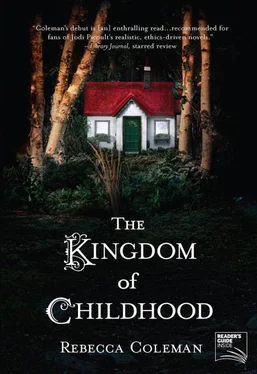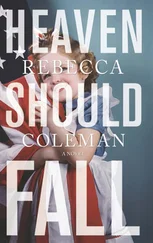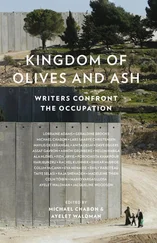Rebecca Coleman - The Kingdom of Childhood
Здесь есть возможность читать онлайн «Rebecca Coleman - The Kingdom of Childhood» весь текст электронной книги совершенно бесплатно (целиком полную версию без сокращений). В некоторых случаях можно слушать аудио, скачать через торрент в формате fb2 и присутствует краткое содержание. Город: Ontario, Год выпуска: 2011, ISBN: 2011, Издательство: MIRA Books, Жанр: Современная проза, на английском языке. Описание произведения, (предисловие) а так же отзывы посетителей доступны на портале библиотеки ЛибКат.
- Название:The Kingdom of Childhood
- Автор:
- Издательство:MIRA Books
- Жанр:
- Год:2011
- Город:Ontario
- ISBN:978-1-4592-1383-8
- Рейтинг книги:5 / 5. Голосов: 1
-
Избранное:Добавить в избранное
- Отзывы:
-
Ваша оценка:
- 100
- 1
- 2
- 3
- 4
- 5
The Kingdom of Childhood: краткое содержание, описание и аннотация
Предлагаем к чтению аннотацию, описание, краткое содержание или предисловие (зависит от того, что написал сам автор книги «The Kingdom of Childhood»). Если вы не нашли необходимую информацию о книге — напишите в комментариях, мы постараемся отыскать её.
was a semifinalist in the 2010 Amazon Breakthrough Novel Competition. An emotionally tense, increasingly chilling work of fiction set in the controversial Waldorf school community, it is equal parts enchanting and unsettling and is sure to be a much discussed and much-debated novel.
The Kingdom of Childhood — читать онлайн бесплатно полную книгу (весь текст) целиком
Ниже представлен текст книги, разбитый по страницам. Система сохранения места последней прочитанной страницы, позволяет с удобством читать онлайн бесплатно книгу «The Kingdom of Childhood», без необходимости каждый раз заново искать на чём Вы остановились. Поставьте закладку, и сможете в любой момент перейти на страницу, на которой закончили чтение.
Интервал:
Закладка:
“I’ve already put this crap behind me,” I told Russ. “I’m already getting on with my life.”
He sighed deeply. The corner of his mouth tugged toward his ear. “Let’s not say it for now, all right?”
“Say what?”
“The D word.” I frowned, and in an exasperated voice he added, “The one that means a marriage is over.”
“That’s two D words,” I corrected. “Doctoral dissertation.”
He laughed loudly and raised a hand from the steering wheel to rub his weary eyes. “Oh, Judy,” he said. “God, how I’ve fucked it up.”
I turned and gazed out the window at the spare rural landscape, the red barns that dotted the dying fields, like chambered hearts in the midst of nothing.
21
1965
Mainbach, West Germany
Through the window, the barn looked little different from the houses around it: plastered white and half-timbered, with a sloping tangerine roof set with metal brackets to hold the snow. Past the dust of the barnyard, green hayfields waved all around it. She leaned her forehead against the glass and sighed. Two weeks had passed since she had last tried to visit. She passed the long days in her bedroom for the most part, lying on the floor in front of the whirring fan her father had bought for her at the PX, reading her worn copies of The Blue Fairy Book and The Secret Garden and two Bobbsey Twins mysteries. Now and then she took out Struwwelpeter and turned its pages slowly, translating in her mind as she mouthed the German words, mulling over its subtitle: Merry Rhymes and Funny Pictures. And then, when her father was home, Kirsten would knock on her door and send her out to the garden to play. Except for today, when he had decided they would all go on one of his cultural excursions together, with Kirsten joining them to provide “context.”
“Off we go, sport,” said her father. “Ready for an adventure?”
She let the curtain drop and followed him and Kirsten out to the Mercedes. Judy climbed into the back; Kirsten took the front passenger seat. Judy scowled and curled against the opposite door, keeping her gaze on the landscape as the car rumbled off toward the village of Aichach.
They were visiting Burg Wittelsbach, a site outside the main village which Judy understood, from its name, to be a castle. Along the way her father rolled down the windows, letting in the rush of the wind, which battered Judy’s face with the scents of grass and fertilizer. The town rose up alongside the road, the staggered medieval buildings at its center flanked by modern ones. And then the land opened again into its summer splendor: ragged and stretching stalks of feed corn, lacy columns of hops climbing their trellises, combed fallow fields the color of coffee grounds. In the very middle of one of these stood a wooden crucifix as tall as a man. Its Christ suffered beneath a small peaked roof that protected him from the elements. The base of the cross stuck deep in the rich, crumbling soil, amidst the long mounds ready for the planting of cabbages. She would miss this place. All of it: the mountains and the snow, the smells of field pollens and manure, the windows thrown wide open to the air, the imposition of nature. The imposition of God.
They turned onto a smaller road and came to a very old church. Her father parked not far from it and opened the trunk to retrieve his walking stick—a shining length of knotty wood covered in the small souvenir medallions collected by German hiking enthusiasts. They set out in the direction of the church and then hiked into the woods, where the thin trees grew straight and dense toward the sun, some burdened with lush bands of clinging ivy. Ahead of her Kirsten walked in her boxy, methodical way, skirt swinging like a cowbell. The fabric, white and sprigged with flowers in Easter-egg colors, was the same as the dress her friend had been wearing in the barn. Kirsten wore an apron over hers, knotted demurely on the left side, to indicate she was single.
“Here we are,” her father said, as they arrived at a large block of granite covered in moss. “This marks where the castle used to be.”
Judy screwed up her face. “You mean there’s no castle?”
“Hasn’t been since the year 1209. But this is where the foundation was. Don’t pick at the moss, Judy.”
“Why’d they take it down?”
“Because Count Otto murdered King Philip of Swabia,” he told her, and Kirsten nodded. “Then Count Otto tore it apart and used the stone for other things. Probably to build his own castle someplace else. Or to throw over the walls at people who liked King Philip better.”
She ran her fingers over the German script carved into the stone. Behind the rock sprouted a crowded assortment of trees, their trunks fanning out at angles, all vying for the light. Other than the marker, there was no sign that this place had ever been anything but woods. In a way it was a gravestone, no different from the ones she and Rudi had played among the past winter, but for a place instead of a person. A gravestone for a home.
“Well, I guess we ought to go take a look at the church,” he said. His walking stick thumped against the dirt. “Another day, another plaster Virgin Mary. Lead the way, kiddo.”
“We can skip it. I don’t care about it.”
Her father shot her a disbelieving look. “Are you kidding? You love that stuff.”
She shook her head. She would never be able to explain it in a way that made sense. Lately, during meals, her father had begun to make optimistic small talk about her mother’s condition, how much better she would likely do once she was moved to a civilian hospital back in the States, how glad she would be to know Judy was being well taken care of. Kirsten, now, she has been invaluable, he would say then. And thus would begin a long segue into Kirsten’s virtues, his voice enthused, verb tenses muddied enough that Judy understood he had no intention of leaving the girl behind. At one point she might have confided her fears to Rudi, but now to approach the barn was as daunting as her own home. She had muttered a shy, stammering Ave Maria, and the universe had only twisted the blade.
“Well, I want to see it,” he said. “How can you choose to skip a four-hundred-year-old church? You know you’ve been in Europe too long when those have gotten routine.”
He started toward the church, with Kirsten falling in line behind him and Judy, in turn, behind her. As they walked Judy picked red currants from the bushes along the path, and Kirsten gazed up at the trees, pointing out birds and naming them for Judy. Rotkehlchen. Spatz. Krähe. Her wandering reminded Judy of the story in her schoolbook about the little boy who walked around with his nose in the air, never paying attention to where he was going until he fell into the river. Das ist ein schlechter Spaß, warned the book. That is a bad game. The illustration showed the half-drowned child being dragged from the water with poles, mocked by a trio of fish. Merry Rhymes and Funny Pictures.
“You’d better pay attention to what you’re doing,” Judy warned her in rudimentary German. “If you don’t, you might have an accident.”
The girl cast a nervous glance at her and hurried ahead to where Judy’s father strode onward, walking stick pressing him steadily forward through the forest. The word for accident was so simple in German: Unglück. The opposite of luck, the kind that nobody wished for you in pink icing. It could mean accident , but it could also mean curse . Or catastrophe .
“Come on, kiddo,” called Judy’s father. “Pick up the pace.”
Kirsten looked over her shoulder at Judy, and Judy smiled. Three at a time she popped the red currants into her mouth. She was the cavechild, eating the food the primeval garden offered her, following the tribal king. Speaking the language that winnowed words down to their simplest terms, forcing them into meanings that were foggy yet dense, like the morning.
Читать дальшеИнтервал:
Закладка:
Похожие книги на «The Kingdom of Childhood»
Представляем Вашему вниманию похожие книги на «The Kingdom of Childhood» списком для выбора. Мы отобрали схожую по названию и смыслу литературу в надежде предоставить читателям больше вариантов отыскать новые, интересные, ещё непрочитанные произведения.
Обсуждение, отзывы о книге «The Kingdom of Childhood» и просто собственные мнения читателей. Оставьте ваши комментарии, напишите, что Вы думаете о произведении, его смысле или главных героях. Укажите что конкретно понравилось, а что нет, и почему Вы так считаете.












